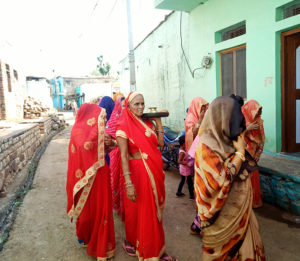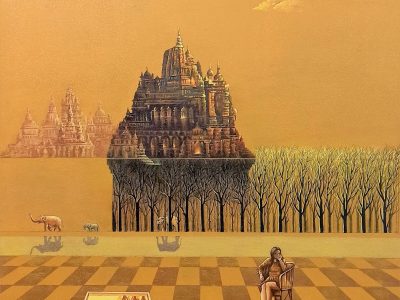Amidst the disruption of normal lives by the Coronavirus, marriages are making a comeback without the usual pomp and show
The pandemic brought on by Covid-19 has reshaped our reality. As people are coming to terms with the ‘new normal’, social events like marriages are making a comeback. In India, weddings have always been an important event and celebrated with much pomp and show– a gathering of at least 200 people is considered normal.
The pandemic has restructured the idea of the ‘big fat Indian wedding’. Flashy, fancy ceremonies have had to take a backseat. Even as many weddings have been postponed, others are taking place without the familiar fanfare.
Bablesh Dhakad, a 26-year-old constable in Guna, MP was planning to get married when the pandemic upset his plans. “Marriages happen once in a lifetime. Without guests in attendance, it’s not possible. With so many restrictions, marrying at this time is not a good idea,” he says.
However, not all believe that a crowd is necessary to the union of two souls. That is certainly the case with Amit, a mechanical engineer based in Gurugram. He opted for a marriage in the presence of only a select few family members and friends. Inter-faith marriages in Delhi-NCR are also taking place quietly, with friends being informed via Facebook posts and on WhatsApp groups.
In Parichha, a village in Shivpuri district, as many as four weddings were scheduled for 28 June. All four marriages were low-key, without elaborate arrangements. This did not hamper the celebrations. Weddings are not a one-day function — the celebration goes on, from weeks before to till at least a month after the marriage.

The wedding festivities started a month before the scheduled date. Every day, women of the village were invited for a gathering in the wedding home calledbulauua — they would then sing banna-banni songs dedicated to the groom and bride.
This time around, Coronavirus also finds mention in the lyrics, which are usually adapted to suit the particular couple and their family members. Songs like ‘Banni tere jhumke pr corona (bride! Corona is on your earrings), have been added to the wedding jukebox. Village women often use idiomatic language within family celebrations. This song meant, “Hey bride! The special day of your life is ruined by this Corona but your groom is ready to bring you to his home”.
Pre-nuptial rituals like Haldi and Tel are taking place as usual but the number of people attending and the excitement has somewhat dampened.
People in the village are conscious of the disease but not in a state of panic as no case of infection has been detected in the village and few cases have been detected in nearby regions. People in all four marriages gathered but not in as large numbers as they used to, fear of the virus was not palpable as many guests were seen without masks.
Parichha is a very small village with a population of around 3,000. In normal times, after a match is fixed, the village barber goes from home to home extending invitations to people from each family.
The village is divided along caste lines: Aheerpura and Kirarpura are the names of localities where people from these caste lives. But in this time of a pandemic, the question of whom to invite was looming in every wedding family. If you don’t invite a certain family or a caste, the village would criticise you.
Interestingly, one marriage was a love match. The groom Akash, assistant commandant in CRPF, was to marry a girl from Singrauli. From talk about the bride’s caste to speculations about where they met, the village was full of gossip.
Prior to the outbreak of the virus, Akash’s wedding was scheduled to take place on 4th May, but it had to be postponed. “I initially thought I have to drop the idea of marrying this year but it is now happening,” he confided.

A lot of villagers are saying that since Akash is an ‘officer’, the marriage must be flashy and fancy but the actual celebrations belied expectations. The marriage took place in the presence of 30-40 close relatives. After performing some initial functions in the village, the groom’s family went to Singrauli for the wedding and brought the bride back to the village.
Usual rituals like the groom arriving on a mare were also set aside for simpler wedding processions to the mandapa (pillared hall) put up at home.
Many villagers grumbled that they are seeing such marriages for the first time. “What is the point if someone can’t spend on their marriage? If this goes on, weddings would happen this way only,” they said. Villagers fear that the Coronavirus is making people asocial and suspicious of each other.
Illogically, upper caste families are more suspicious of lower caste persons as they fear they may spread the disease. Even in towns, whenever someone gets infected, many are speculating about contact with some lower caste migrant labourer returning home.
Many in the village have postponed weddings. Those who haven’t, are doing so out of compulsion. In Akash’s case, his marriage was already delayed due to various factors. Since no end of the pandemic is in sight, he decided to get married at the earliest.
The break with centuries-old traditions is making village society uncomfortable and they are cursing the virus. Nonetheless, he pandemic is re-shaping the idea of marriage. It can be a good idea as many people in villages spend a lot on marriages, some by taking hefty loans from banks and moneylenders.
If such marriages become a norm, the idea of keeping weddings low-key could relegate the big fat Indian wedding to a relic of the past.
About time.
(Cover: The Coronavirus pandemic has changed the Indian wedding scenario Photo: click.in)





